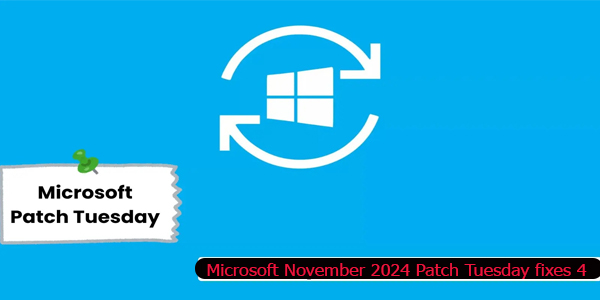Microsoft’s latest Patch Tuesday update fixes 89 security vulnerabilities. Four of these are zero-day vulnerabilities, with two currently being exploited. This patch release highlights the need for timely updates to guard against cyber threats.
Zero-Day Vulnerabilities Patched:
The four zero-day vulnerabilities patched in this update include two that attackers have actively exploited:
CVE-2024-43451 – NTLM Hash Disclosure Spoofing Vulnerability:
This vulnerability lets remote attackers access NTLMv2 hashes with minimal user interaction, like clicking on a malicious file. They can use these hashes to impersonate the user and gain unauthorized access to sensitive systems. It has been actively exploited and poses a serious risk to all supported Windows versions.
CVE-2024-49039 – Windows Task Scheduler Elevation of Privilege Vulnerability:
This flaw lets attackers gain higher privileges by exploiting a vulnerability in the Windows Task Scheduler, allowing them to run restricted RPC functions and possibly execute unauthorized code or access resources. Similar to CVE-2024-43451, this vulnerability is actively being exploited.
Additionally, two other zero-day vulnerabilities were publicly disclosed but not yet actively exploited:
Attend a Free Webinar on How to Maximize Cybersecurity Program ROI
CVE-2024-49040 : Microsoft Exchange Server Spoofing Vulnerability:
This vulnerability lets attackers fake email addresses in Microsoft Exchange Server, tricking recipients into engaging with harmful content.
CVE-2024-49019 – Active Directory Certificate Services Elevation of Privilege Vulnerability
Attackers can exploit a flaw in Active Directory Certificate Services due to weak authentication methods, allowing them to gain domain administrator privileges.
Vulnerabilities Overview.
The 89 vulnerabilities addressed in this update span a wide range of categories:
52 Remote Code Execution (RCE) vulnerabilities: These flaws let attackers run their own code on affected systems from a distance.
26 Elevation of Privilege (EoP) vulnerabilities: These allow attackers to gain unauthorized higher-level access.
4 Denial of Service (DoS) vulnerabilities: These can disrupt services by overloading systems.
3 Spoofing vulnerabilities
2 Security Feature Bypass (SFB) vulnerabilities
1 Information Disclosure vulnerability.
Critical Vulnerabilities:
Four vulnerabilities have been rated as critical by Microsoft due to their potential for severe exploitation:
CVE-2024-43639 : Windows Kerberos Remote Code Execution Vulnerability:
This vulnerability lets attackers execute remote code by exploiting weaknesses in the Windows Kerberos protocol. Microsoft rates it as critical but believes exploitation is unlikely due to its complexity.
CVE-2024-43625 – Hyper-V VMSwitch Elevation of Privilege Vulnerability:
An attacker could use this flaw to send specific network packets and gain higher access on a Hyper-V host.
CVE-2024-43498: .NET and Visual Studio Remote Code Execution Vulnerability:
This serious vulnerability lets attackers run harmful code on weak .NET programs by sending specially designed requests.
CVE-2024-43602: Azure CycleCloud Remote Code Execution Vulnerability:
If an attacker with basic user access takes advantage of this issue, they could obtain higher privileges on an Azure CycleCloud cluster.
Organizations and users must apply these patches immediately due to the serious nature of the vulnerabilities, especially the two active zero-days. Delaying updates risks exposing systems to attacks.
Windows users can obtain cumulative updates for Windows 10 and 11 through Windows Update or the Microsoft Update Catalog. Administrators in large environments should prioritize patching systems that are most vulnerable to critical and actively exploited flaws.
Microsoft’s November Patch Tuesday underscores the importance of cybersecurity, as attackers exploit zero-day vulnerabilities. Keeping systems updated is crucial to reduce risks from these security issues.
 InfoSecBulletin Cybersecurity for mankind
InfoSecBulletin Cybersecurity for mankind














